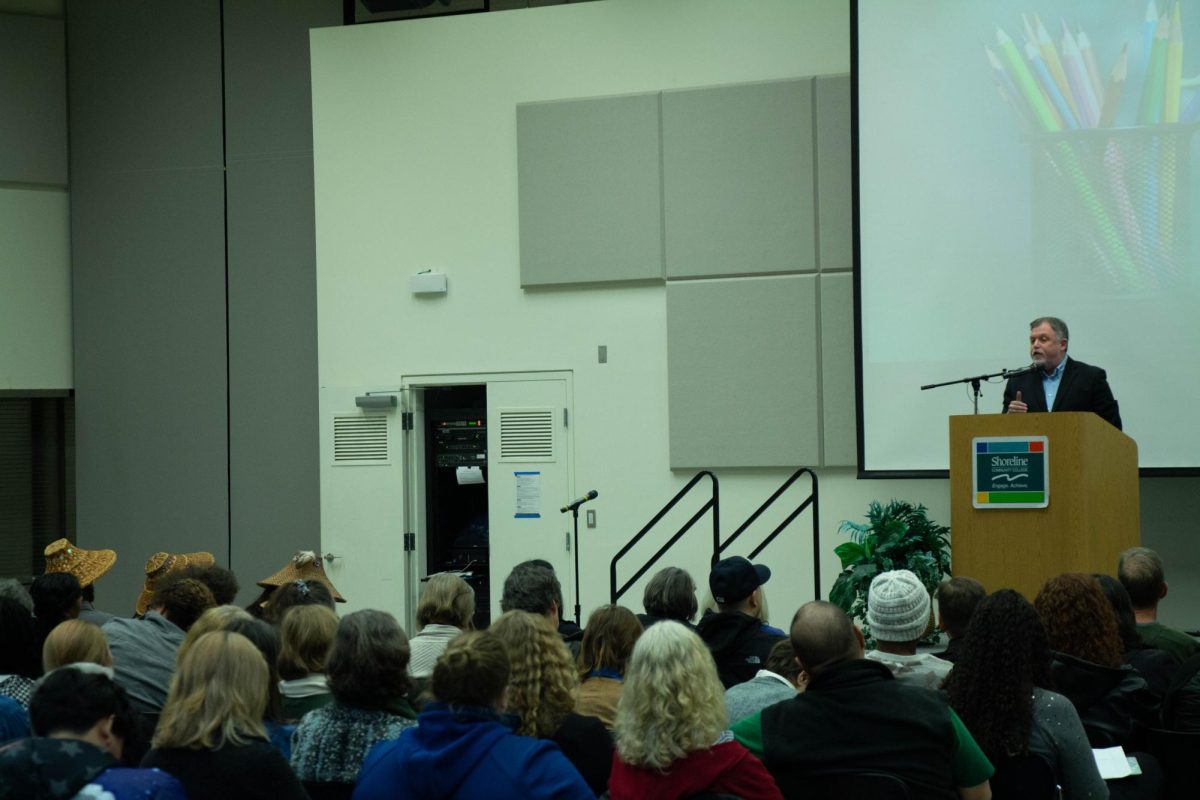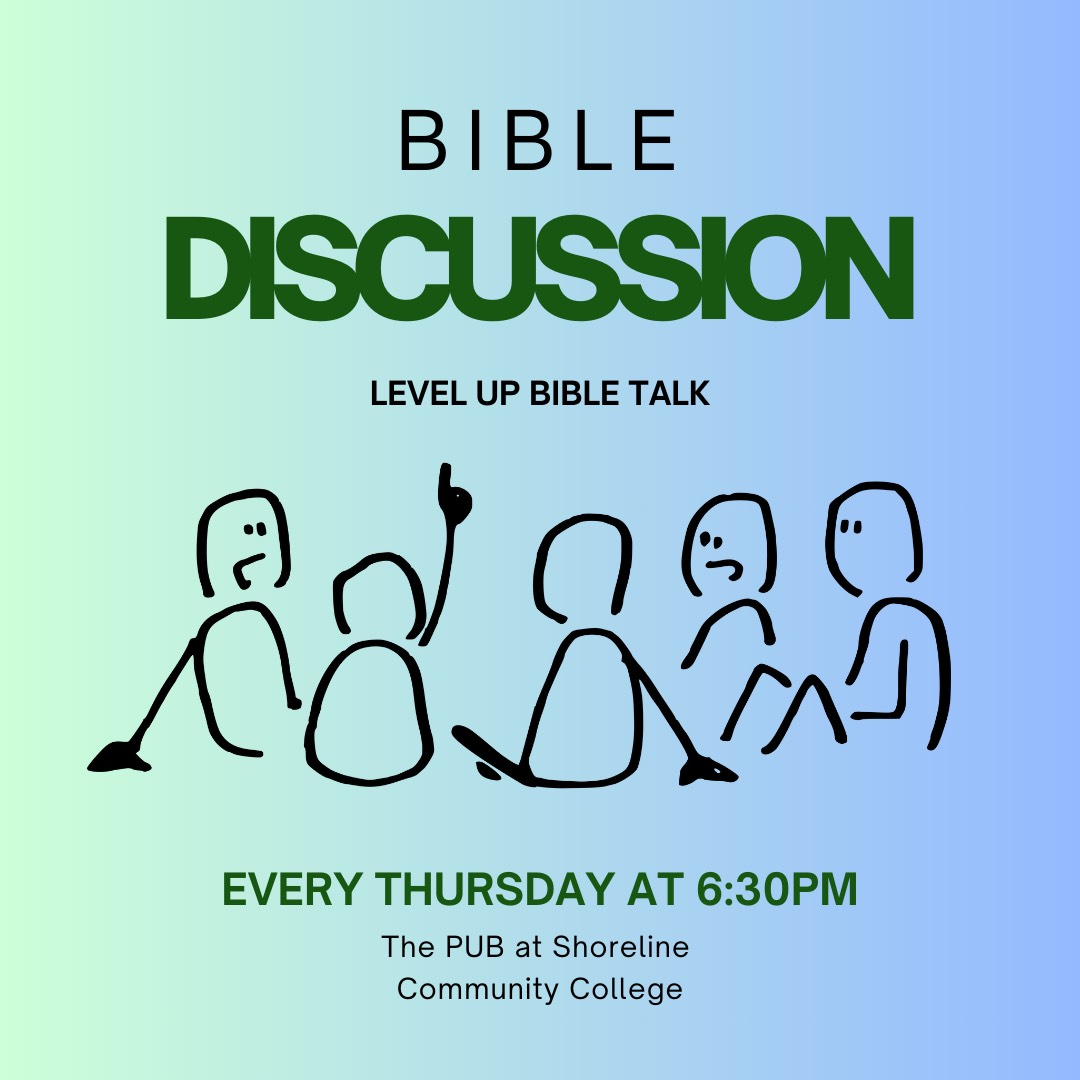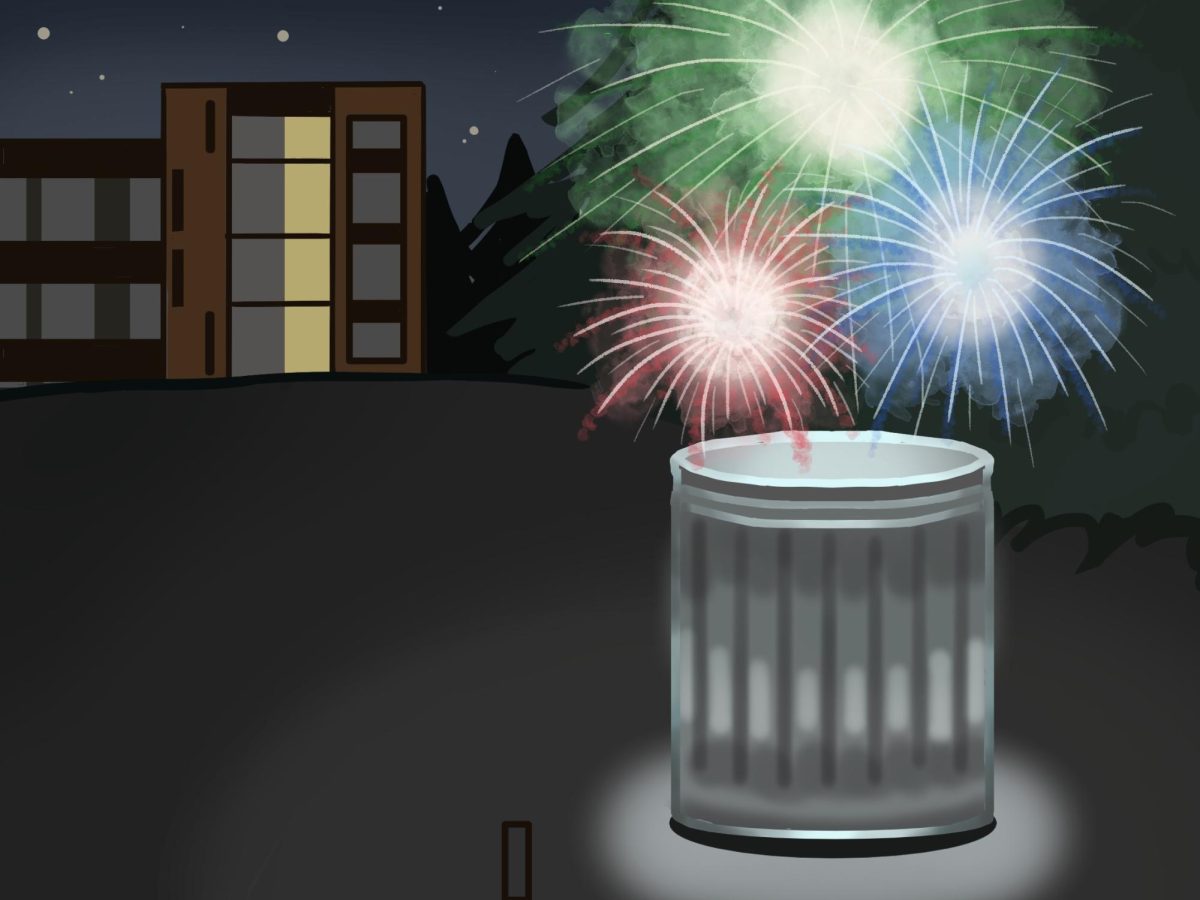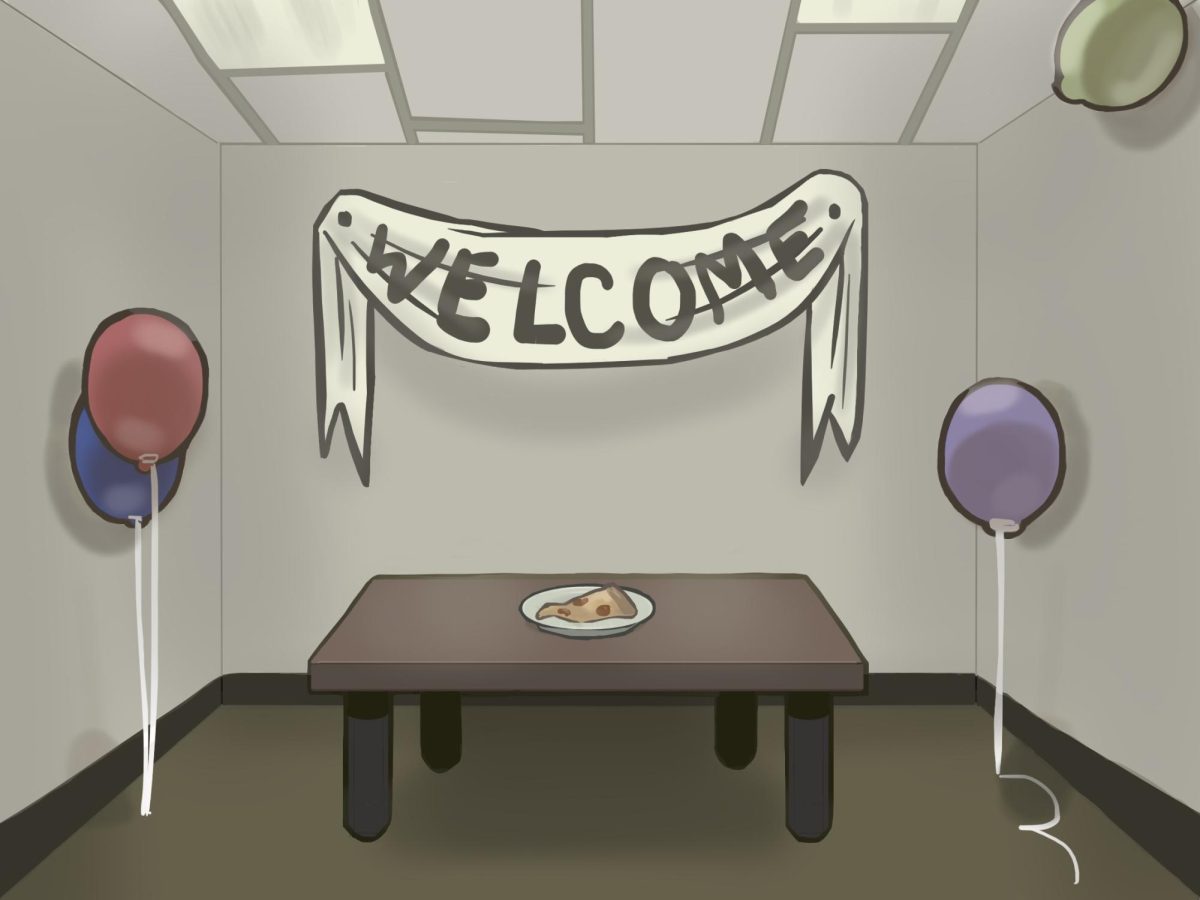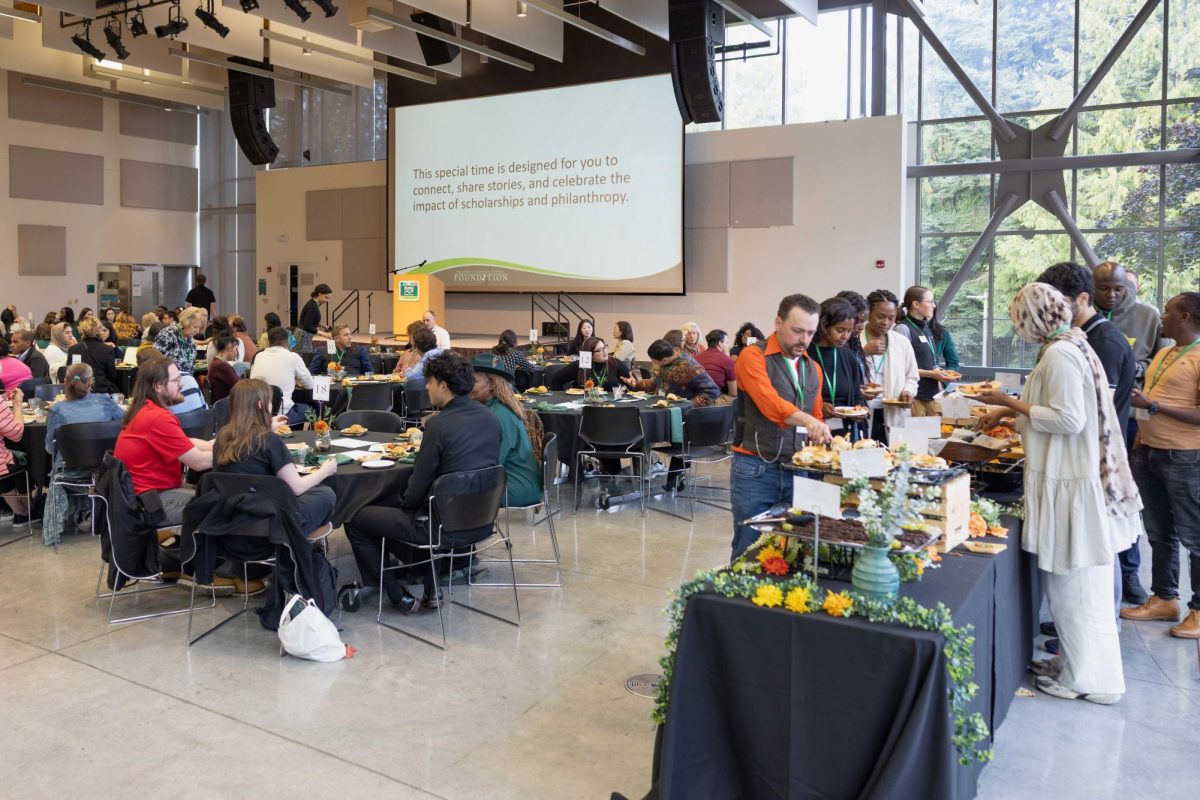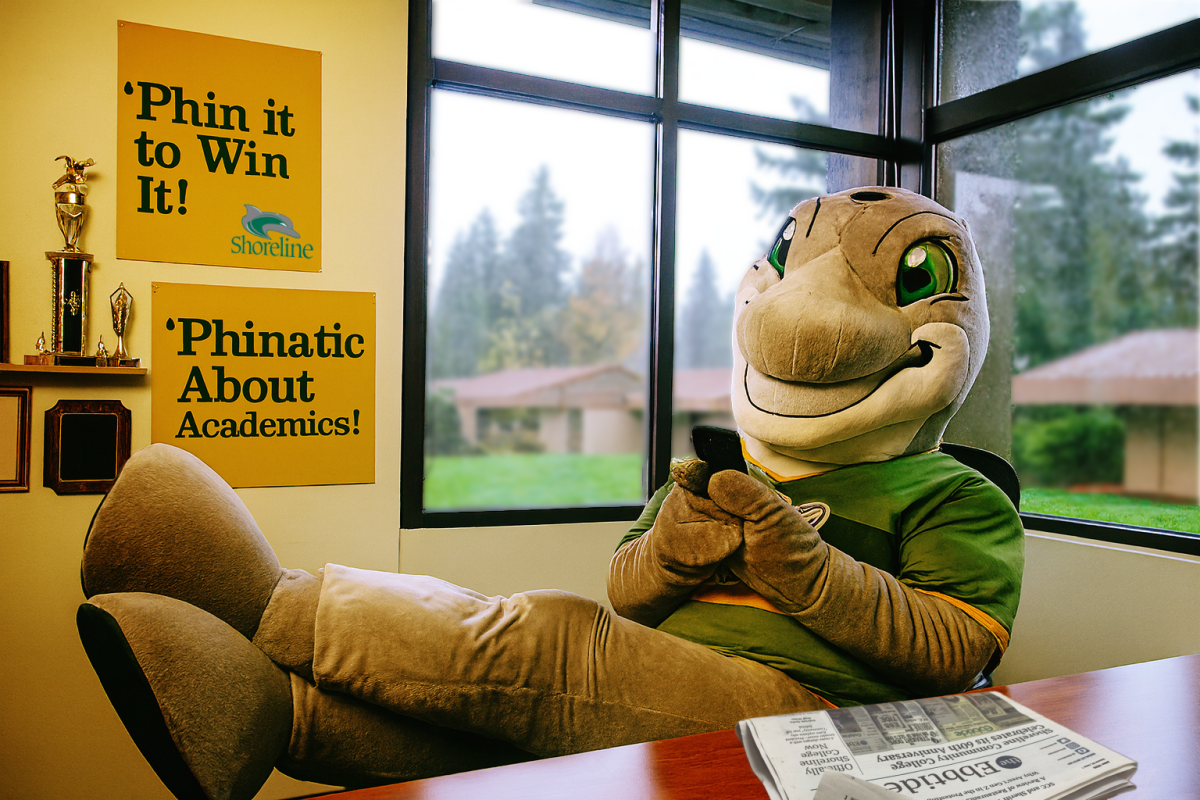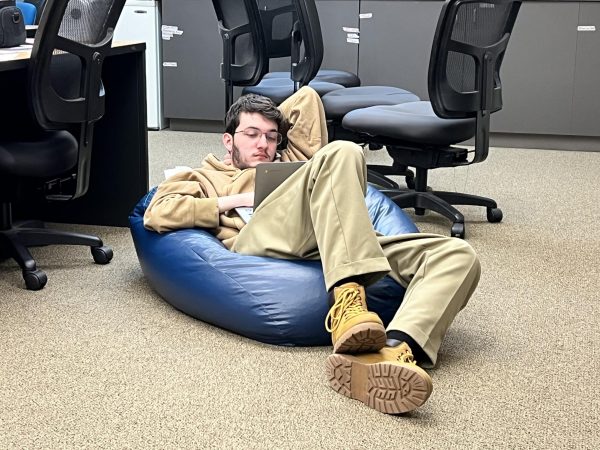On a cold evening in early March, over 100 students, faculty and community members gathered in the PUB main dining room at Shoreline Community College to hear a middle-aged man from Tennessee defend an obscure legal theory against attacks from a Gig Harbor man with a SubStack column and the ear of a national cable news channel.
Activist Tim Wise spoke on the topic of critical race theory (CRT), and the attacks coming from conservative activists threatened by diversity, equity, inclusion and accessibility (DEIA) programs. His foil for the evening was columnist and cable news pundit Christopher Rufo, who lives on the Olympic Peninsula.
“The narrative was shifting, and in response to that, we should have been expecting Chris Rufo,” Wise said.
The program presented on March 7 was titled, “The Attack on CRT, and Anti-Racist Education.” CRT, developed by academics in the 1970s, has become a shorthand for DEIA policies meant to address inequality due to systemic racism. These contentious policies have grabbed headlines across the nation, as they found a home in educational institutions and corporate America.
Rufo, who was contacted by The Ebbtide after the program, responded via email with an insult. “I don’t know who Tim Wise is, but I applaud anyone who, despite profound intellectual disadvantages, summons the courage to speak in public,” he said.
Man of the hour
Wise, an author, anti-racism activist and educator, got his start organizing against David Duke, a self-avowed white supremacist running for governor and senator of his home state of Louisiana during the early 1990s. So far, attacks on CRT and DEIA have not been enough to stop SCC from completing a comprehensive revising and updating of its Equity-Centered Strategic Plan to address past shortcomings and meet the future needs of our increasingly diverse community of domestic and international students.
The program started a few minutes late — due to a delayed Washington State Ferry — with the now-traditional land acknowledgement, delivered by Ellie Abraham from the Suquamish tribe. SCC’s land acknowledgement begins with, “Shoreline Community College acknowledges that we occupy the ancestral lands of Coast Salish peoples, in particular the Duwamish tribe. We see you, respect your right to sovereignty and self-determination, and are committed to being better listeners, learners, and in lifting Indigenous voices.” These statements have been criticized locally by a University of Washington professor as “inappropriate”, and nationally by the Association of Indigenous Anthropologists as, “Doing more harm than good,” they say.
At just before 6:30 p.m., event organizer and American Ethnic Studies professor Nicole Buyagawan introduced Wise to applause. The event was presented by Shoreline Community College Foundation, WAVES for Asian American Native Hawaiian Pacific Islanders, the Multicultural Center, and the Office of DEIA.
Over the course of the next hour, Wise entertained the audience, relating personal stories which informed his politics, ”If you are progressive and white in the South… race will be the crucible through which you had to come to get to your politics.”
Wise is an engaging speaker, and the audience snapped their fingers in agreement over the skewering of his targets, laughing at the insinuation that in order to open a recreational cannabis business, he could, “get a storefront in the state of Washington now, and an occupational license, ’cause apparently that’s all it takes [is] being white and having drug experience.’”
To CRT or not to CRT?
Wise defended CRT and equity programs, and rebuked attacks on them by the likes of Rufo. Wise contended that Rufo has been successful in his attacks on CRT in government and schools. “Now we have 20-plus states that have limited or banned materials that are ‘intended to generate shame or guilt’ on the basis of race,” he said.
The most substantive counterarguments to CRT come from other anti-racist educators.
Professor Glenn Loury at Brown University agrees with a key CRT concept from Robin DiAngelo’s ‘White Fragility.’ “Defense mechanisms around biased social cognition prevent honest confrontations with it,” he told Current Affairs. Yet, he strongly disagrees with affirmative action. “Don’t dishonor my amazing achievement by chalking it up to favoritism. I resent it. I don’t like it. I don’t need it. I don’t want it. That’s not a political position. I’m defending my own dignity here,” said Loury.
There are possibilities for grace even in disagreement. Columbia University Associate Professor John McWhorter, no fan of CRT, recently rose to the defense of rival Ibram X. Kendi, no fan of McWhorter. “The thing is that, whatever one makes of his beliefs, there is all evidence that Kendi is quite sincere in them. If some of us perceive duality and circularity in his thinking, that’s fine. A public intellectual is entitled to his views, and if an interested public wants to pay, in some form, to consider those views, then that should be fine, too,” said McWhorter.
Wise doesn’t want educators restricted from engaging in conversations about CRT. From the podium, Wise said, “If Chris Rufo gets his way… you won’t be allowed to use that terminology, in case little Susie Suburb in some fifth grade class gets upset and goes and tells her mom and dad.”
Addressing concerns that CRT in education or the workplace might cause white people to feel shame, Wise said, “If you’re a white person who learns history and decides that you feel bad about being white, it’s ’cause you’re learning about the wrong white people.”
‘Perfect villain’
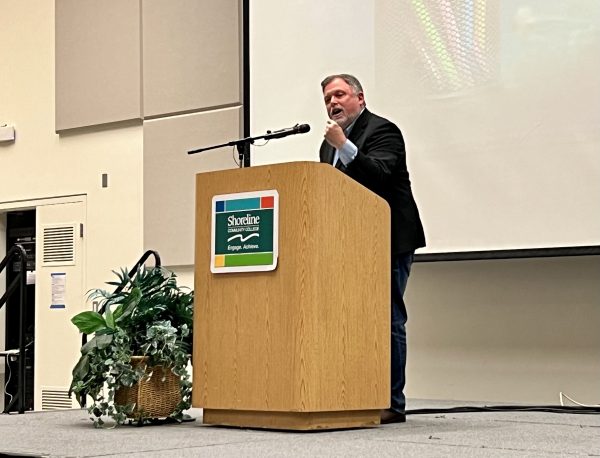
During his self-described “monologue”, Wise said that critics are using the term as a placeholder for policies they disagree with, “First of all, for it to be an attack on critical race theory, those launching the attack would have to understand just what the hell critical race theory is.”
In a 2021 interview in The New Yorker magazine, Rufo explained how CRT became his target, “‘Critical race theory’ is the perfect villain,” he said. Also in the interview, Rufo explained the reasoning behind his attacks on CRT, quoting a conservative who felt, “‘These institutions that I believe in’ — the school, the workplace — ‘are being devoured by an ideology I don’t understand.’” Wise quoted Rufo, saying he, “didn’t give a shit about what critical race theory did and didn’t say.”
Wise says a key concept of CRT, that racism is systemic, has roots in Dr. Martin Luther King Jr.’s 1967 speech before the American Psychological Association, where King refers to the barriers that prevented Black people from fully participating in American society, “their plight was not a consequence of superficial prejudice, but was systemic,” said King.
All politics is local
In an interview with The Ebbtide, Wise spoke about the difficulties of engaging in the generational struggle for egalitarianism in a multicultural society with a history of inequity. We met in the Staff and Faculty Lounge, behind the Avanti Market, where Wise sat alone, collecting his thoughts before addressing the audience awaiting him.
Despite, “all of the backlash to anything even remotely resembling an equity program, let alone even a conversation, is as dispiriting as it is,” he said, “it’s also important to remember that the reason we’re in [this] phase is because those of us who do this work have, to a certain extent, been effective in the last three decades at shifting the conversation and the narrative.”
The stakes were high during the Civil Rights Era of the 1960s, but victory felt near, just as it did during the summer of 2020, and yet, “Everybody that I’ve talked to, who was around and old enough in 1968, thought the revolution was right around the corner,” Wise said. “Everyone else who thinks that they’re going to usher in justice as some permanent condition, they’re all going to be very disappointed and they’re probably going to burn out if they don’t have a more realistic assessment.”
The importance of listening to the voices of the people who are most affected by racism is paramount. Affected communities are stressed, exhausted and demanding action. One woman of color educator who spoke during the question and answer session said, “I feel like it’s a lot of BIPOC women who are always talking and we’re sick and tired, sick and tired, especially when we’re working in education.”
In our interview and in his lecture, Wise often referred to the successes that activists have achieved over the years, including, “Lots of white folks — most of whose names are not known like the handful of us are — but that’s because they’re trying to do collective community work. If we don’t have people doing that stuff at the community level, the handful of public intellectuals aren’t gonna mean anything, right?”
Whether CRT and DEIA programs survive the attacks on them won’t be decided by the popularity of the public intellectuals who tout their benevolence or malevolence, but by the effects they have on the lives of people in affected communities just like ours here in Shoreline.


